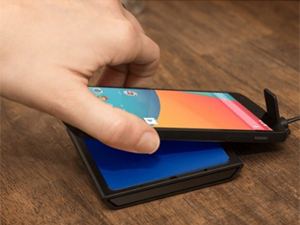



Date:14/02/17
 Researchers at the Massachusetts Institute of technology (MIT) have devised a new wireless charging process aimed at impeding counterfeit wireless chargers.
Researchers at the Massachusetts Institute of technology (MIT) have devised a new wireless charging process aimed at impeding counterfeit wireless chargers.
Like all charging products, wireless chargers being manufactured by third-parties are often sold as official products. A report from the MIT news website, citing research from Britain’s Chartered Trading Standards Institute published last year, claims that “of 400 counterfeit chargers it bought from a range of online retailers, 397 failed a basic safety test.”
The solution is a wireless charger which uses a cryptographic authentication technique known as elliptic curve cryptography. Through this process, an electronics device can verify the wireless charger it’s sitting on and halt the charge if the unit fails the authentication test.
The MIT researchers say that the technology would also house another benefit: charging two devices simultaneously would occur at a more even pace. Current wireless charging effectiveness depends on the proximity of the devices to the internal electrical coil but the MIT solution would mean that one device isn’t left behind while the other grabs all of the juice.
The developments have been sponsored by MIT Lincoln Labs, Texas Instruments, and the Taiwan Semiconductor Manufacturing Company and could go a long way to discouraging the sales of counterfeit products, should they be implemented on a wide scale.
The MIT report also references research from Apple from late 2016, stating that “of 100 Apple-branded charging accessories it bought on Amazon, 90 were counterfeits.”
Though smartphone manufacturers have a financial motivation to make you fear third-party chargers or those from other manufacturers, if you do want the official product, I’d visit the manufacturer website rather than sellers on Amazon or eBay.
MIT researchers create secure wireless chargers to prevent device damage
 Researchers at the Massachusetts Institute of technology (MIT) have devised a new wireless charging process aimed at impeding counterfeit wireless chargers.
Researchers at the Massachusetts Institute of technology (MIT) have devised a new wireless charging process aimed at impeding counterfeit wireless chargers.Like all charging products, wireless chargers being manufactured by third-parties are often sold as official products. A report from the MIT news website, citing research from Britain’s Chartered Trading Standards Institute published last year, claims that “of 400 counterfeit chargers it bought from a range of online retailers, 397 failed a basic safety test.”
The solution is a wireless charger which uses a cryptographic authentication technique known as elliptic curve cryptography. Through this process, an electronics device can verify the wireless charger it’s sitting on and halt the charge if the unit fails the authentication test.
The MIT researchers say that the technology would also house another benefit: charging two devices simultaneously would occur at a more even pace. Current wireless charging effectiveness depends on the proximity of the devices to the internal electrical coil but the MIT solution would mean that one device isn’t left behind while the other grabs all of the juice.
The developments have been sponsored by MIT Lincoln Labs, Texas Instruments, and the Taiwan Semiconductor Manufacturing Company and could go a long way to discouraging the sales of counterfeit products, should they be implemented on a wide scale.
The MIT report also references research from Apple from late 2016, stating that “of 100 Apple-branded charging accessories it bought on Amazon, 90 were counterfeits.”
Though smartphone manufacturers have a financial motivation to make you fear third-party chargers or those from other manufacturers, if you do want the official product, I’d visit the manufacturer website rather than sellers on Amazon or eBay.
Views: 525
©ictnews.az. All rights reserved.Similar news
- The mobile sector continues its lead
- Facebook counted 600 million active users
- Cell phone testing laboratory is planned to be built in Azerbaijan
- Tablets and riders outfitted quickly with 3G/4G modems
- The number of digital TV channels will double to 24 units
- Tax proposal in China gets massive online feedback
- Malaysia to implement biometric system at all entry points
- Korea to build Green Technology Centre
- Cisco Poised to Help China Keep an Eye on Its Citizens
- 3G speed in Azerbaijan is higher than in UK
- Government of Canada Announces Investment in Green Innovation for Canada
- Electric cars in Azerbaijan
- Dominican Republic Govt Issues Cashless Benefits
- Spain raises €1.65bn from spectrum auction
- Camden Council boosts mobile security





















